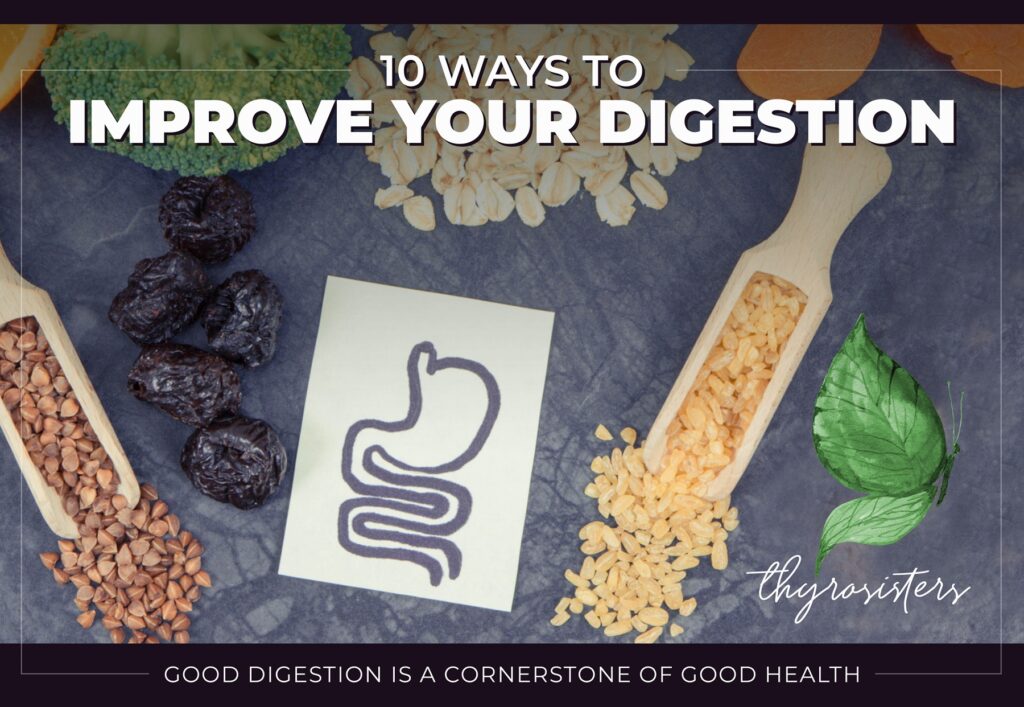Our digestive system isn’t something most of us notice… until something goes wrong. Then, our troubled tummies are all we can think about! Good digestion is a cornerstone of good health, so if you’ve been struggling with your gut, it’s imperative to take action to improve your digestion.
Why Fixing Your Gut Is So Important
All the systems of the body are interconnected, and the digestive system is no exception. Think of your gut as your nutritional distribution center. This is where your body breaks down the food you eat and ships the nutrients to your cells so your body can function and thrive. When you begin to experience digestive issues, such as cramping, bloating, gas, diarrhea, or nausea, your gut is telling you something is wrong.
Gut troubles can gum up the works of your digestive system, leading to nutritional deficiencies and other far-reaching problems throughout your body. Sometimes an unhappy stomach is a result of a larger health issue, such as an autoimmune disorder like hypothyroidism. In other cases, a few lifestyle changes can improve your gut health and eliminate your symptoms.
Here are 10 powerful tips to improve your digestion. I suggest you try these recommendations first. If you are still having digestive problems, then it might be time to dive a little deeper and look for underlying illnesses.
-
Eat Natural Foods
Whenever possible, choose the least processed food options for your meals. Yes, this is an obvious tip, but I still need to include it because so many people are filling their bodies with processed foods. Choose raw apples over apple juice. If you eat grains, choose whole grains over refined flour. Eating natural foods, like vegetables, lean meats, legumes, and fruits will give you much more nutrition than processed foods. Additionally, the excess sugars, sodium, and additives in processed foods can irritate your gut and cause bloating and cramps. (Learn more about how to eat to improve your healthy gut bacteria.)
-
Eat More Fiber
Fiber is to your digestive tract like oil is to a car engine. It helps everything move along much more smoothly. Water soluble fiber, like the kind found in strawberries, beans, and oats, absorbs water and fluids to create a gel that can feed healthy bacteria in your gut, helping your gut microbiome to flourish. Insoluble fiber, which can be found in many vegetables and whole grains, is also a boon to your gut. This type of fiber doesn’t dissolve and instead moves all the way through your gut. It bulks up your stools, making it easer for you to have a healthy and complete elimination.
-
Drink Water
Do you bring a water bottle with you to work or keep a glass of water near you at home? If not, then it’s time to adopt this healthy habit. Dehydration is one of the most common causes of constipation. If your body needs water, it will pull it from your digestive tract, which makes it difficult to get things moving in that department.
Drinking plenty of water throughout the day will help you develop a more consistent and less difficult elimination routine. (It also helps your skin look great!) If you find it hard to get yourself to drink water throughout the day, try some natural flavoring or sip on tea. Avoid drinks that dehydrate you, like alcohol or sweetened drinks. You already know that sodas are full of sugar and additives, so I’m just going to assume they aren’t in your fridge at home!
-
Embrace Healthy Fats
Not all fats are created equally. Omega-3 fatty acids are thought to lower the risk of heart disease and also protect you from everything from depression to dementia. They may also help prevent unpleasant digestive disorders, like Crohn’s Disease and ulcerative colitis. Your body doesn’t produce omega-3 fatty acids, so you need to add them into your diet. Try sprinkling hemp seeds, chia seeds, and nuts on your meals. You can also bake fatty fish, like salmon, for dinner.
-
Keep Your Stress Under Control
It’s impossible to eliminate all stress from our lives – and some stress can be good for us. However, one of the most common symptoms of chronic stress is tummy troubles, like cramping or even ulcers. Why does this happen? It’s because your gut is home to millions of neurons that constantly communicate with your brain. (Did you know the gut is sometimes called the body’s “second brain?”) When the brain gets stressed, so does your stomach. (Stress can also make your Hashimoto’s worse!)
This is yet another reason to practice self-care and to work to eliminate toxic people and situations from your life. In particular, try to keep mealtimes relaxing and stress-free.
-
Practice Mindful Eating
To springboard off the previous digestion tip, think about the way you consume your food. It’s become normal for Americans to eat at their desks, eat in the car between chores, or to mindlessly snack in front of the TV. If you’ve caught yourself doing any of these things, think about renewing your relationship with your food. Honor yourself and your meals by eating mindfully. That means turning off the television and sitting at a table. Offer gratitude for your food and take in the taste, smell, and texture of your meals.
Eating mindfully is a great way to slow down your consumption, which can help you avoid overeating. It also gives your digestive system time to process and digest the foods you are giving it. (Consider syncing meals with your body clock for better thyroid health.)
-
Add More Chewing
Mindful eating can help you chew your food more thoroughly. It’s a good idea to chew each bite 20 to 30 times. This allows your saliva to begin breaking down the food, which makes it easier for your gut to digest. Taking the time to chew is another great way to slow down mealtime and allow your body to communicate with you when it’s full. Best of all, you’ll be able to fully taste and experience your food, which should improve your mealtimes.
-
Exercise
Is there anything exercise isn’t good for? (If so, I haven’t found it yet!) Our bodies were meant to move, so it’s no wonder that regular movement and exercise can protect us from disease, improve our mood, help us live longer, and improve our digestion. Scientists have found that exercise can improve the rate at which you digest food, which can help you experience more regular eliminations. Any level of movement is better than none, so try an online yoga class, take a walk around the neighborhood, or join a local boot camp. Exercise can also lower your stress, giving you another digestive bonus.
-
Break Bad Habits
Need another reason to cut back on alcohol and finally kick that smoking habit? These habits could be negatively affecting your digestion. Smoking and alcohol are digestive irritants. Smoking also significantly increases your risk of acid reflux, peptic ulcers, colon cancer, and Crohn’s disease.
-
Eliminate Gluten
If you’ve been a ThyroSister for any amount of time, then you know I am a huge advocate of eliminating gluten from your diet. Many people are gluten intolerant and don’t even know it. If you have an autoimmune disease, like Hashimoto’s (a condition that is highly underdiagnosed) gluten can exacerbate your symptoms and even lead to a condition known as leaky gut. (Which is exactly what it sounds like.)
Do me a personal favor and cut all forms of gluten out of your diet for 30 days. Be thorough. Gluten has been known to sneak into many products that you’d never guess, like soups, salad dressings, and even cosmetics. At the end of the 30 days, consider how you feel. If you are more clear-headed, awake, and focused, and if your stomach is settled and calm, then a gluten-free life might be the right option for you.
Exploring Other Causes of Digestive Troubles
These 10 digestive health tips are a great start to improving the function of your gut. However, there are many conditions that can harm your digestive health. If these changes don’t fix your gut problems, then it’s time to start testing you for other conditions, such as hypothyroidism. That happens to be my specialty. I love soothing angry tummies and helping my clients rediscover their energy and joy. Schedule a Clarity Call today. I want to hear about all your symptoms so we can begin putting together an action plan to get you and your tummy well.
References:
Anderson JW, Baird P, Davis RH Jr, Ferreri S, Knudtson M, Koraym A, Waters V, Williams CL. Health benefits of dietary fiber. Nutr Rev. 2009 Apr;67(4):188-205. doi: 10.1111/j.1753-4887.2009.00189.x. PMID: 19335713.
Everhart JE, editor. The burden of digestive diseases in the United States. US Department of Health and Human Services, Public Health Service, National Institutes of Health, National Institute of Diabetes and Digestive and Kidney Diseases. Washington, DC: US Government Printing Office, 2008; NIH Publication No. 09-6443.
Boekema PJ, Samsom M, van Berge Henegouwen GP, Smout AJ. Coffee and gastrointestinal function: facts and fiction. A review. Scand J Gastroenterol Suppl. 1999;230:35-9. doi: 10.1080/003655299750025525. PMID: 10499460.
Oettlé GJ. Effect of moderate exercise on bowel habit. Gut. 1991 Aug;32(8):941-4. doi: 10.1136/gut.32.8.941. PMID: 1885077; PMCID: PMC1378967.
McFarland LV. Use of probiotics to correct dysbiosis of normal microbiota following disease or disruptive events: a systematic review. BMJ Open. 2014 Aug 25;4(8):e005047. doi: 10.1136/bmjopen-2014-005047. PMID: 25157183; PMCID: PMC4156804.






